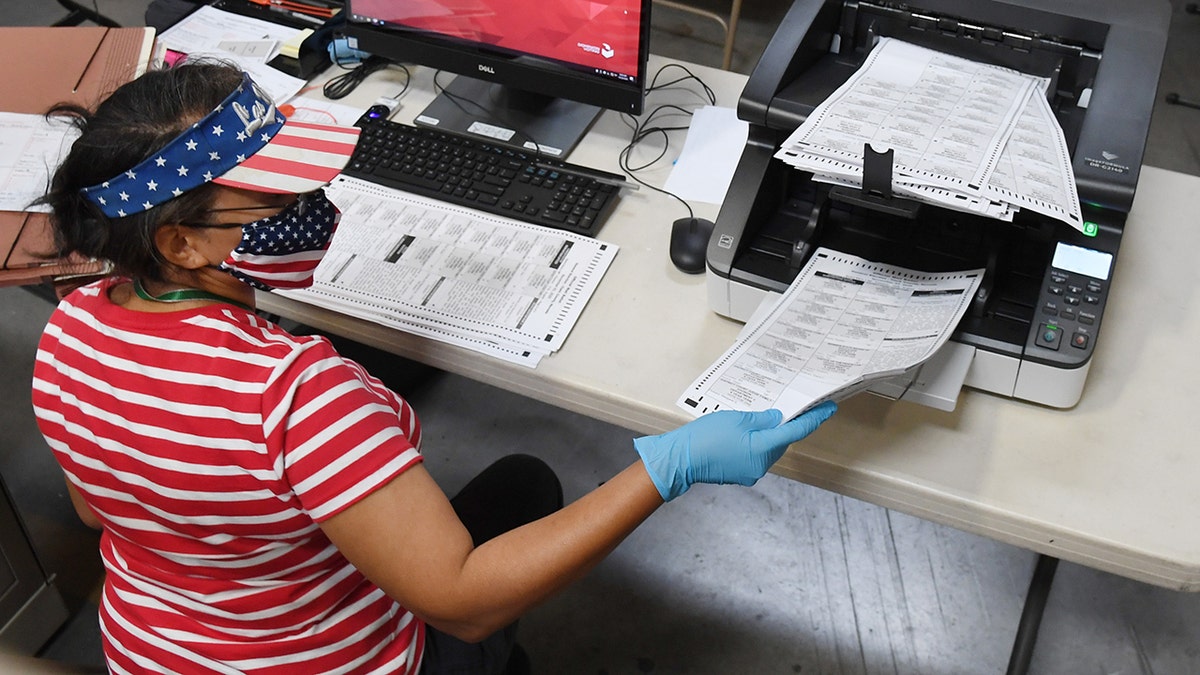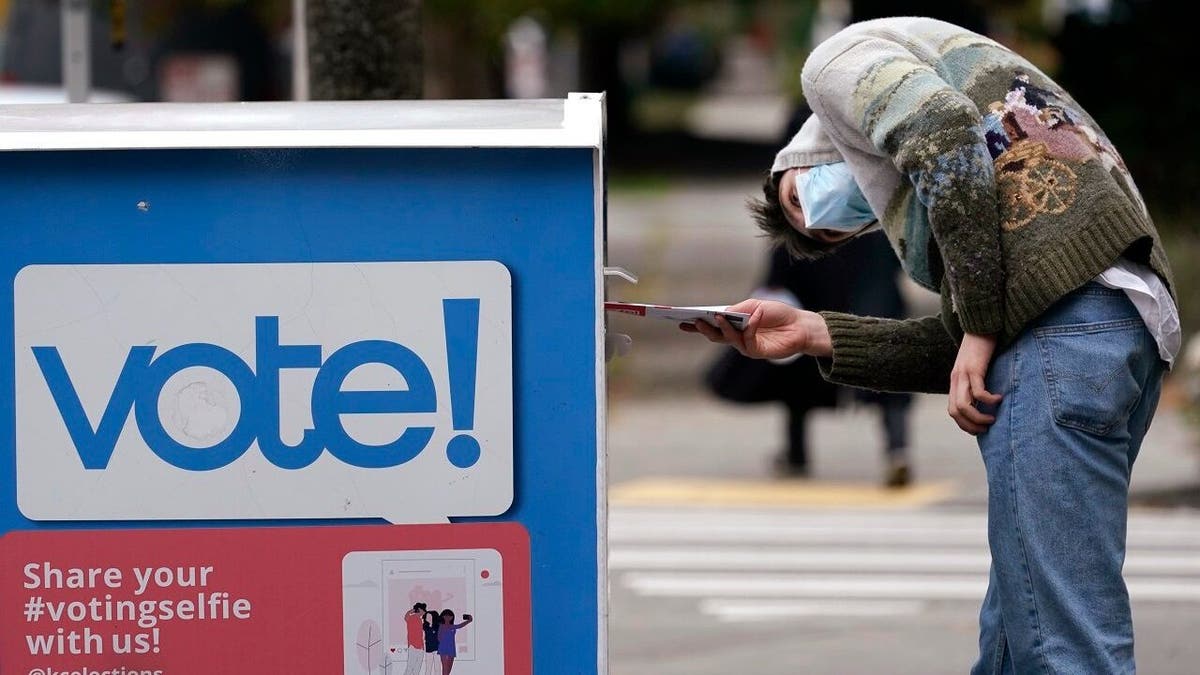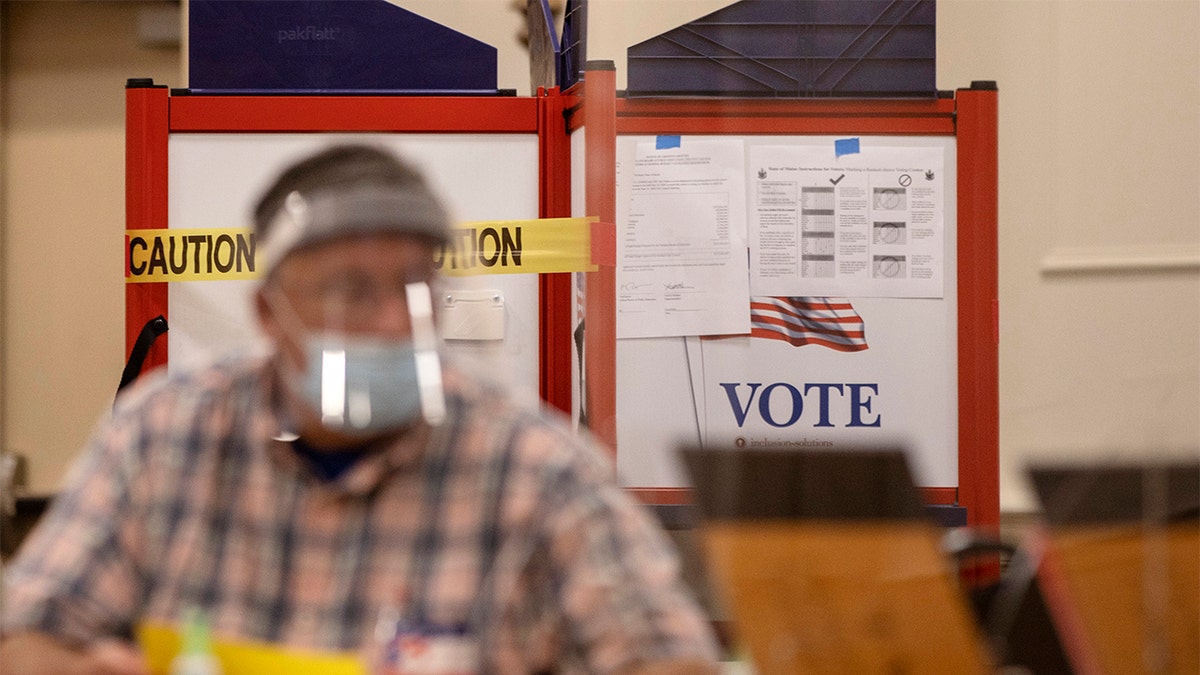A federal audit found problems with 20% of Election Assistance Commission grants to aid states with 2020 voting amid a pandemic.
When Congress approved the CARES Act, a COVID-19 relief package, the EAC received $400 million in grants, $326 million of which has been accounted for so far. The Government Accountability Office, a watchdog agency, reviewed how the EAC spent and monitored the grant money in a November report.
House Republicans first flagged concerns about the election grants in September 2020 regarding an expenditure in California. The GAO's findings validate concerns that the problems run deeper than one state, said Rep. James Comer, R-Ky., the ranking member of the House Oversight and Reform Committee.

A Clark County election worker scans mail-in ballots at the Clark County Election Department Oct. 20, 2020 in North Las Vegas, Nevada. (Ethan Miller/Getty Images)
"The potential for abuse is very high," Comer told Fox News. "The EAC is supposed to be a watchdog, but it turns out it has been a bad actor, spending large sums of money with little transparency."
The audit further determined the EAC allowed states to create 60 additional categories for spending the money rather than assigning expenditures to the assigned five categories.
"GAO found issues with how states and the EAC categorized expenditures involving nearly 20 percent of the total reported spending nationwide," the GAO report says. "As a result, in the EAC's annual grant expenditure report to Congress, states' expenditures for similar or the same items or activities could be included under multiple categories, making it difficult to consistently determine, by category, how states spent the grant funds."

A voter eyes the opening of a ballot drop box before placing his ballot inside Wednesday, Oct. 28, 2020, in Seattle. (AP Photo/Elaine Thompson)
GOP House members first became concerned about how the CARES Act money for election grants was being spent because of a $35 million contract between the California Secretary of State's office and SKDKnickerbocker, a Democratic political consulting firm that was at the same time working for Joe Biden's presidential campaign. California used $12 million from EAC money to pay for the contract that was used in the "Vote Safe California" program.
"California, when it contracted with SKDKnickerbocker, engaged in microtargeting of voters," Comer said. "To me, that's what a political firm would do. Do we think they were microtargeting Republican voters?"

A voting booth with sides blocked off with caution tape to ensure social distancing at the Italian Heritage Center on Tuesday, July 14, 2020. (Brianna Soukup/Portland Press Herald via Getty Images)
The sheer amount of money almost certainly means similar problems existed in other states, Comer said.
CLICK HERE TO GET THE FOX NEWS APP
The GAO, which can’t issue subpoenas or otherwise compel the release of information, did not specify issues in any other states. The audit was based on interviews with EAC officials and a review of public data.
Comer asked EAC Inspector General Brianna Schletz to further investigate how the election grants were spent in 2020 in a letter he signed with Rep. Rodney Davis, R-Ill., the ranking member of the House Administration Committee, and Rep. Jody Hice, R-Ga., ranking member of the House Oversight Subcommittee on Government Operations.
It could take a new majority in Congress to get to the bottom of the matter, Davis said.
"When I am chairman of the House Administration Committee we will make sure the money sent to states is spent correctly, and most of the time it is. But California spent $35 million on a company working for Joe Biden," Davis told Fox News. "There are other cases like the one in California, but I still also want to know what the EAC is going to do about California. It’s why we need an inspector general at the EAC to do their job and give us answers."
Davis expressed frustration with former EAC Inspector General Patricia Layfield who retired earlier this year. Layfield wrote a letter in February asserting the California contract with SKDK may have been inappropriate but did not take further action.
However, Mona Harrington, executive director of the Election Assistance Commission, anticipates some review of the California matter from the inspector general.
"Routine Election Assistance Commission Inspector General audits on CARES Act grants are underway in numerous states, including California. As with any IG report, this information will be disclosed upon completion," Harrington told Fox News.
Under CARES Act grant reporting rules, states submitted 20-day reports after their 2020 primaries and the general election. Those reports were submitted to the EAC and also sent to germane Congressional committees.
"The EAC staff worked diligently and expeditiously to manage an additional $400 million in grant funds provided to the states by Congress to respond to the pandemic during an election year," Harrington continued. "The agency was able to distribute this funding within 30 days and provide significant technical support to the states without additional funding to respond to the pandemic or assist in the administration of the CARES Act funding."
The grants were to be used for states to assist in in-person voting; absentee/mail voting; poll worker recruiting and training and contingency planning.
The GAO report says states "created 60 additional expenditure categories" that included "personal protective equipment and equipment for polling locations;" and "contract services."
Further, the audit says the EAC’s electronic system allows states to "omit or miscalculate expenditure totals" when submitting reports to the commission and that "some states did not include an amount for total expenditures."
The EAC’s response to the GAO appears in the report and says: "Because the EAC’s CARES Act grants program is still open and active, we anticipate additional reporting from states through March 2022, when the last grant closes out. This along with our independent Inspector General audits of the funding will account for all remaining CARES Act grant spending."




